Module_3_On_the_radio-Unit1
外研新标准初中英语八年级下册Module 3 《Unit 1 Remember to look out for the red light》课件-文档资料

6. It’ll start ______ in the afternoon. A. raining B. rainy C. rain
latest newsreader rain Sporrte:port latreespt orrteeprort rreesuplotrter
score resusltunsncyore winwin
latest rain report Weather: reporter sunny
2 Answer the questions. 1. What’s the latest news?
3. How do you think the friends feel about visiting Radio Beijing?
They feel excited.
5 Complete the passage with the correct form of the words in the box.
account; tell; cover v. 报道 n. 报道
report
newsman; newsperson
n. 新闻记者
reporter
mark; get n. 成绩; 分数 v. 得分
everyone
pron. 每个人
score everybody
make reference to
v. 提及
to pay attention to
小心
look out for
外研版九年级英语上册Module 3 Unit 1 教学设计 教案
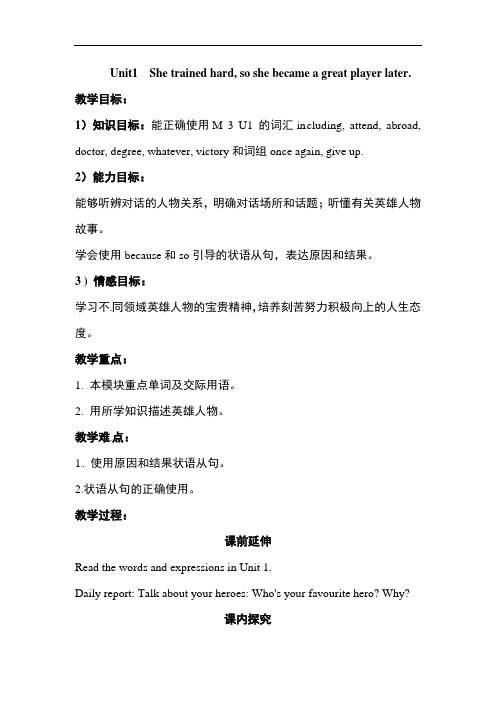
Unit1 She trained hard, so she became a great player later. 教学目标:1)知识目标:能正确使用M 3 U1 的词汇including, attend, abroad, doctor, degree, whatever, victory和词组once again, give up.2)能力目标:能够听辨对话的人物关系,明确对话场所和话题;听懂有关英雄人物故事。
学会使用because和so引导的状语从句,表达原因和结果。
3 ) 情感目标:学习不同领域英雄人物的宝贵精神,培养刻苦努力积极向上的人生态度。
教学重点:1. 本模块重点单词及交际用语。
2. 用所学知识描述英雄人物。
教学难点:1. 使用原因和结果状语从句。
2.状语从句的正确使用。
教学过程:课前延伸Read the words and expressions in Unit 1.Daily report: Talk about your heroes: Who's your favourite hero? Why?课内探究Step1情境导入A hero is a person who does something extraordinary and who we admire as a result.Sh ow some pictures about the people who became heroes of all types: sportspeople, musicians, ordinary people in extreme situations, characters from films, etc.Talk about why they have become famous.( Use because and so)Step2 Listening1.小听力,一听(自主完成,合作释疑)Now please listen to the tape and answer the questions.(1). Who’s the hero? Den Yaping(2).What are they listening to? Our Heroes.二听:Finish Activity 2, choose the best answer.1. Who are the speakers?A A student and a teacherB Two studentsC A person on the radio and a guest2. Where are the speakers?A At a stationB In a classroomC At home3. What are they talking about?A A famous personB A teacherC A friend2.大听力(多层听)一层听:Listen ,。
一年级起新标准英语第四册课文文本
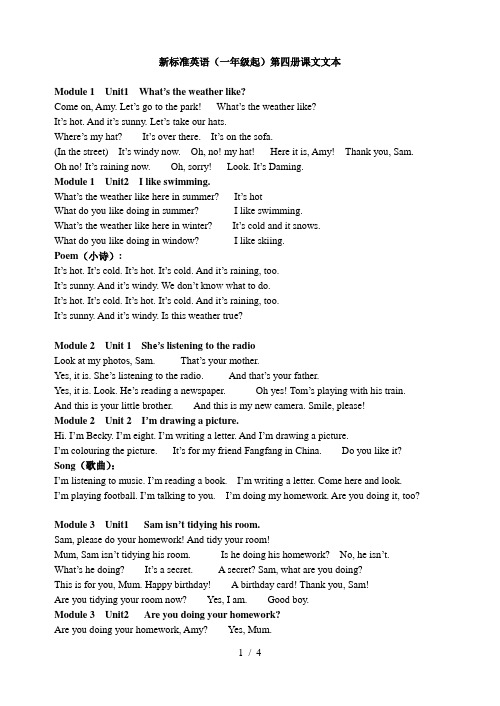
新标准英语(一年级起)第四册课文文本Module 1 Unit1 What’s the weather like?Come on, Amy. Let’s go to the park! What’s the weather like?It’s hot. And it’s sunny. Let’s take our hats.Where’s my hat? It’s over there. It’s on the sofa.(In the street) It’s windy now. Oh, no! my hat! Here it is, Amy! Thank you, Sam. Oh no! It’s raining now. Oh, sorry! Look. It’s Daming.Module 1 Unit2 I like swimming.What’s the weather like here in summer? It’s hotWhat do you like doing in summer? I like swimming.What’s the weather like here in winter? It’s cold and it snows.What do you like doing in window? I like skiing.Poem(小诗):It’s hot. It’s cold. It’s hot. It’s cold. And it’s raining, too.I t’s sunny. And it’s windy. We don’t know what to d o.It’s hot. It’s cold. It’s hot. It’s cold. And it’s raining, too.It’s sunny. And it’s windy. Is this weather true?Module 2 Unit 1 Sh e’s listening to the radioLook at my photos, Sam. That’s your mother.Yes, it is. She’s listening to the radio. And that’s your father.Yes, it is. Look. He’s reading a newspaper. Oh yes! Tom’s playing with his train. And this is your little brother. And this is my new camera. Smile, please!Module 2 Unit 2 I’m drawing a picture.Hi. I’m Becky. I’m eight. I’m writing a letter. And I’m drawing a picture.I’m colouring the picture. It’s for my friend Fangfang in China. Do you like it? Song(歌曲):I’m listening to music. I’m reading a book. I’m writing a letter. Come here and look.I’m playing football. I’m talking to you. I’m doing my homework. Are you doing it, too?Module 3 Unit1 Sam isn’t tidying his room.Sam, please do your homework! And tidy your room!Mum, Sam isn’t tidying his room. Is he doing his homework? No, he isn’t. What’s he doing? It’s a secret. A secret? Sam, what are you doing?This is for you, Mum. Happy birthday! A birthday card! Thank you, Sam!Are you tidying your room now? Yes, I am. Good boy.Module 3 Unit2 Are you doing your homework?Are you doing your homework, Amy? Yes, Mum.Amy, you’re drawing a picture! You’re not doing your homework!Mum, I’m drawing a picture of flowers. It’s my Science homework today!Poem(小诗):Are you doing your homework? Are you listening to music?Are you tidying your room? Are you reading a book?Are you drawing a picture? Are you watching TV?I’m coming to your room. I’m coming to you.Module 4 Unit 1 What are you doing?Hi, Amy. Hi, Lingling. What’s that noise? Are you drinking? No, I’m not.Are you eating? No, I’m not eating. So what are you doing? I’m talking to you.And what’ that noise? Oh, that noise! It’s Tom.What’s he doing? He’s playing with his train.Module 4 Unit 2 What’s he doing?Where’s Lingling, Daming? She’s there. What’s she doing? She’s playing a game with Amy and Sam. What game are they playing? They’re playing five-stones.Poem(小诗):What are you doing? We’re very late. Hurry up! Hurry up! Please finish your cake! What are you doing? Please put on your shoes! Hurry up! Hurry up! There’s no time to lose.Module 5 Unit 1 Lingling is skipping. (It’s playing time)Fangfang, are you sad? Yes, no one is playing with me. Lingling is skipping.Daming and Sam are playing hide-and-seek, Daming is hiding and Dam is seeking.Those girls are playing clapping games. Do you like clapping games? Yes, I do.Well, let’s play clapping games together! One, two, three, four. I am opening the door. Five, six, seven, eight. Hurry up! Don’t be late.Module 5 Unit 2 What are you playing?What are you playing? We’re playing catch. The girls are running.The boys are catching them. Can I play with you? Yes, you can.Poem(小诗):We’re playing in the playground. Some are running races.We’re having lots of fun. Some are playing catch.Running and skipping together, everyone. Some are playing football together in a match.Module 6 Unit 1 I usually play basketball.On Sundays, I usually play basketball. It’s Sunday today. But he’s not playing basketball.I usually help my father. But he’s not helping me today.I usually ride my bike. But he’s not riding it today.And I susally do my homework. He’s not doing his homework now.Today he’s not doing these things. He’s in bed. He’s ill. But I am watching TV.Module 6 Unit 2 We are helping her.My grandma usually cooks. And she usually goes shopping. But today she isn’t doing these things. Today I am cooking. And my father is going shopping. Today is Grandma’s birthday. Today is Grandma’s birthday and we are helping her.Module 7 Unit 1 It’s Children’s Day today.Good morning. Boys and girls. I’m Xiaohu from School TV. It’s Children’s Day today.Look. The children are very happy. Daming is doing a play with some children.Lingling is singing a song. Sam is saying a poem. Amy is dancing.Now, look. Children from Class 2 are coming. They’re doing a dragon dance.Module 7 Unit 2 We’re having a picnic.My name’s Tingting. I’m at the park with my family. We’re having a picnic. My father is flying a kite. My mother is eating. And my grandma is sleeping. I am drawing a picture. The weather is good. It is sunny and warm.Song(歌曲):It’s Children’s Day. Let’s play! Let’s play! It’s Children’s Day today.It’s Children’s Day. I’m happy to say it’s Children’s Day today.Module 8 Unit 1 The train is going up a hill.Hello. I’m on the train now. Good, I’m at the station.The train is going up a hill. Now it’s going down a hill.Now, it’s going past a hospital. Now it’s stopping at the station.I can see you! And I can see you, too!Module 8 Unit 2 We’re turning aroundWe’re going up. We’re going down. We’re turning around.We’re touching the sky. We’re touching the ground. And how we’re turning around again. Song(歌曲):Shake, shake, shake your shoulders. Shake them up and down.Shake, shake, shake your shoe and stamp it on the ground.Module 9 Unit 1 Turn left!What are you going, Sam? I’m going to Daming’s flat.Where is it? It’s in West Lake Road.Excuse me. Where’s West Lake Road. Go straight on! Then turn right!Then turn left! Thank you! You’re welcome. Daming, I’m lost!Where are you? I’m in West Lake Road. I live in East Lake Road. Not West Lake Road. Module 9 Unit 2 Where do you live?Where do you live? I live I Apple Street. And where is Apple Street?Go out of the school. Turn left. Then go straight on. You go past the factory.Then you turn right. That is Apple Street.Poem(小诗):Left foot, right foot, Left foot, right. Marching all day, and marching all night.Go straight on, now turn right. Left foot, right foot, left foot, right.Unit 10 Unit 1 It’s next to the park.Sam, this is my cousin Lin. Nice to meet you. Nice to meet you, too.Excuse me. Where’s the supermarket, please?Go straight on. Then turn left. I t’s next to the park.Excuse me, where’s the zoo? Go straight on. It’s in front of the school.You know the city well, Lin. Of course! I’m a taxi driver! Ha,ha,ha.Unit 10 Unit 2 Where’s the toilet, please?Excuse me. Where’s the toilet, please? The girls toilet is over there, on the left.The boy’s toilet is on the right. Thank you. You’re welcome.Poem(小诗);Look left, look right, look left, again. A car is coming. So start again. Look left, look right, then look left, now. Nothing is coming. Let’s cross now.。
外研社英语七年级 Module3 My school 知识点 归纳 (1)

外研社七年级英语模块3 My school 知识点归纳知识点一:模块3短语1.a lot of furniture很多家具2.on everyone's desk在每个人的课桌上3.on the teacher's desk在老师的讲桌上4.on the classroom walls在教室的墙上5.at the front of the classroom在教室的前面6.a map of the world 一张世界地图7.school gate校门8.office building办公楼9.classroom building教学楼10.dining hall食堂11.science building科技楼12.student apartment学生公寓13.science lab科学实验室puter room计算机房15.guard house门卫室16.school clinic医务室17.radio station广播室18.teachers' office教师办公室nguage lab语音室20.women's room女厕所21.men's room男厕所22.reading room阅览室23.a lot of大量;许多24.dining hall饭厅,饭堂25.between…and…在……之间26.in the middle of在……中间27.on the right of在……的右面28.on the left of在……的左边知识点二:重点词语解释Unit one1.…,what's your classroom in England like?在英格兰,你们的教室是什么样子的?What be…like?是询问“某人或某物是什么样子的”常用句型。
如:What's the weather like today?今天天气怎样?2.furniture n. 家具(总称)furniture统指家具,不指单件家具,前面不能加a,也没有复数形式。
外研版九年级英语上册Module 3 Unit 1 课件

3. How many gold medals has she won in the Olympics? A. Three B. Four. C. Five.
_U_n_i_v_e_rs_i_ty_______________
知识链接
include和 including都有“包含”的意思。 include是及物动词,在句中作谓 语; including是介词引导的介词短语在句中作状 语,起补充说明的作用,前面可用逗号隔开。 例如:
My work includes cooking meals, cleaning the
including a gold medal and a silver
medal.
包含、包括
adv.在国外
She studied abroad, and she got a d_o_c_t_o_r'_s_d_e_g_r_e_e at Cambridge University.
博士学位
无论什么、不管什么
3. Whatever she does, she never gives up! 无论做什么,她都不放弃!
give up的意思是“放弃”,可直接跟名 词、V-ing形式作宾语,后接代词作宾 语时,要将代词放在give和 up之间。例 如:
David has decided to give up football at the end of this year. 戴维已经决定今年年底就不再踢足球了。
外研版八年级英语下册Module10 Unit1课件

=If it rains tomorrow,I won’t go by plane.
(2)如果你带你的狗狗去参加玛丽的聚会,她会很开心的。
If you take your dog to Mary’s party, she will be very happy .
(3)You’d better travel around Nanjing with a local tour guide D you want
2. We collect _t_h_e_l_a_t_e_st__n_a_ti_o_n_a_l_a_n_d______ i_n_t_e_r_n_a_ti_o_n_a_l_n_e_w__s and write reports in the newsroom.
3. You should _sp_e_a_k__E_n_g_l_is_h__r_e_a_ll_y_w__e_ll__ if you want to be a presenter.
Module 10 On the radio Unit 1 I hope that you can join us one day.
Words and expressions
/də'rektə;daI'rektə/ 导演;主管;经理 n. director
/ʃəʊ/
引领;带领 v.
show
/ə'raʊnd/
studio
/‘stju:dɪəʊ/ n.演播室
1W. hWenhethneirte’sdoling,hittismoena,nits…meansw_e_’_r_e__o_n__a_ir__. 2W.We sehsohuoldul_d__aa_vv_oo_iid_d_…m__a_k_i_n_g__a_n_y__n_o_ise
外研版(三起)-英语-五年级下册--Module1Unit1教材同步讲解

外研版(三起)-英语-五年级下册--Module1Unit1教材同步讲解【新课堂】Module1 Unit 1教材同步讲解同学们,你们知道许多年前你们的爷爷奶奶过着怎样的⽣活吗?你们了解他们现在的⽣活和过去的⽣活有着什么样的变化吗?⼀起来学习⼀下吧,学习怎样⽤英语描述过去和现在的⽣活的变化吧!语法索引Unit l(第⼀单元)1.still的⽤法,in the UK与in England的区别及with的⽤法 (6)2. look的⽤法,祈使句简介及about的⽤法……⼀………⼀(7)3.come的含义……⼀………..(8)4. life的⽤法及辨析very与too,many与some.ago与before (8)5.how的⽤法……“ ………..(9)6. live in的⽤法及辨析house, home与family (10)7.-般过去时及enough的⽤法 (10)8.There be句型及辨析some与any9.have表⽰“有”……10.动名词的⽤法…11.现在进⾏时简介…………Unit 2(第⼆单元)12.really的⽤法……13.辨析talk,say和speak……15.or的⽤法………16.miss的⽤法……17.hope的⽤法……18. back then酌⽤法…………模块⽬标预览学前必备知识⽬标语⾳能熟练掌握⾳标/eI/,/o:/,/a:/的发⾳要领,并能分辨字母组合ai,al,ar,au和ay在单词中的发⾳。
词汇单词life(⽣活),different(不同的),ago(以前),teievision(电视机),enough(⾜够的),change(改变,变化),night(夜晚,夜间),or(也不,也没),couldn't= could not(不能),write(写),grandchildren,lady(⼥⼠,夫⼈),fire(⽕,炉⽕),radio(收⾳机),hope(希望),telephone (电话),field(⽥地),programme(节⽬),interviewer(采访者)短语a programme about China(⼀个关于中国的节⽬),many years ago(许多年前),live in a small house(住在⼀所⼩房⼦⾥),enough food(⾜够的⾷物),lots of buses and cars(许多公共汽车和⼩汽车),talk to...(和…~交谈),have got(拥有),watch TV(看电视),talk about(谈论),on a fire(在炉⽕上),in the fields(在⽥地⾥),in the UK(在英国)同学们,下列词汇要求你们能听懂、会说、会读,你们能做到吗?单词world(世界),past(过去),wherever(各处,处处)短语every day(每天),how about_(……怎么样),miss China(想念中国)句型同学们,下列⽇常⽤语要求你们能听懂、会说、会读、会写,你们能做到吗?1.There be句型的过去时:There was/wasn't/were/weren't+某⼈/某物⼗某地.某地有/没有某⼈/某物。
九年级上册外研版Module3unit1
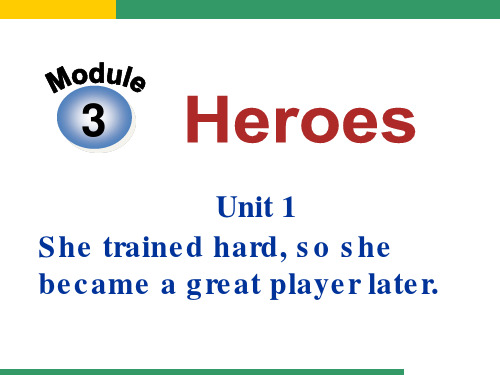
once again
博士 n.
doctor
课程,学位 n.
degree
无论什么;不管怎么样 whatever
放弃(努力)
give up
惊人的;(口)极好的 adj. amazing
意志;决心 n.
will
获胜;胜利 n.
victory
实在,的确 adv.
simply
1.Work in pairs. Look at the picture and say who the person is and why she is famous.
clever表示“聪明;灵巧” That is a clever plan. 那是个巧妙的计划
wise;bright;clever;smart 表示“聪明”是 的用法比较
(1) wise意为“聪明;英明”,它常用来说明一 个人有智慧,远见和谋略;也可指由于知识、 经验丰富及良好的判断能力而正确对待或处 理人和事,常用于正式、客气的场合。注意: 它多用来说明名人或伟人。例如: a wise saying 至理名言
Daming: Yes, and she helped make the Beijing Olympics a victory for world sport. She’s simply the best!
Ms Li: She is a true hero.
1. She’s my hero because she’s one of the best players in the world.
as well as和 not only… but also…同义,但前 者的语意重点和后者的语意重点恰好颠倒。
(2). 如果 as well as用作连词引出比较从句,其 义为“和…一样好”。 He speaks Spanish as well as English. 应译作:“他说西班牙语像说英语一样好”。 语意的重点依旧在前部,不在后半部。
新外研版八年级英语下册导学案Module 10-On the radio(Unit1-Unit3)

外研版八年级英语下册导学案Module10 On the radioUnit1 I hope that you can join us one day一、学习目标:1.知识目标:(1)掌握下列词汇:director, avoid, background, background, national, international, interview, on air, presenter(2)掌握下列句型及短语:①Thank you for showing us around.②When it’s o n, it means we’re on air.③Come this way.④It gets crazy in here.⑤show sb. around ⑥on air⑦avoid doing sth.⑧make noise ⑨in the backgroun⑩ keep studying2.能力目标:能够听懂和读懂在广播中常用的词汇、短语和句型,并将节目与常用词汇对应起来。
3.情感目标:初步了解新闻传媒,了解媒体人的工作。
二、学习重、难点:1.重点:掌握宾语从句,掌握动词后接(to)+v.或v.ing的形式。
2.难点:掌握动词(to)+v.或v.ing的形式作宾语三、自主学习:1.词汇速记引领,带领(v)________ 避免,防止(v)________背景(n)__________国家的,国内的(adj)______direct(v) → _____(n)导演,主管,经理present(v) → __________(n)主持人2.短语互译be on________ avoid doing sth___________ make noise_____________come this way_____________ over there______________带某人参观______________(广播或电视)播出_________________四、学习过程:Step1. Warming-upFree talk: Do you listen to the radio?Do you like listening to the sports news programme?Do you like listening to the news programme?Do you like listening to music?Which presenter do you like best?Step2.Pre-listening1.Listen and check(√ ) the types of news you hear.culture government sports weather2.Listen again and complete the sentences.(1)Zhang Li reads ______________________________________ on Radio Beijing.(2)The president of Russia will stay in China for________________.(3)The match is between _______________and_________________.Step3.Fast-listeningListen and answer:1.What should we avoid doing in the background?2.Do they collect the latest national and international news in the newsroom?Step4.Careful-listeningListen again and complete the notes.1.When the red light is on,it means______________________________________.2.We collect_____________________________and write reports in the newsroom.3.You should________________________________if you want to be a presenter.4.This is also where we_________________________with the big sports stars.plete the sentences with the words in the box.1.Newspaper and television programmes often have__________with famous people.2.More and more ___________students are coming to China to learn Chinese.3.Every country has its own ________hero—a person who did something very important for the country and its people.4.Try to_______drinking too much tea or coffee, or you will not be able to sleep well.5.Could you speak a l ittle bit louder,please?It is very noisy in the ________________.Step6.Work in pairs.Ask and answer questions about the radio.1.What do you like listening to?2.What do you not like listening to?3.What programme did you listen to the last time you turned on the radio?4.What do you need to do if you want to be a presenter?nguage points.1.show v. 引领,带领【语境领悟】*Thank you for showing us around. 感谢你带领我们参观。
外研版八年级英语下册教案 M10U1
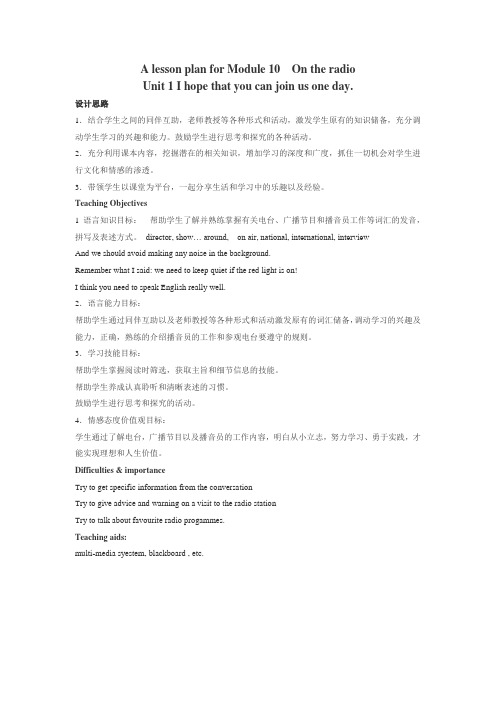
A lesson plan for Module 10 On the radioUnit 1 I hope that you can join us one day.设计思路1.结合学生之间的同伴互助,老师教授等各种形式和活动,激发学生原有的知识储备,充分调动学生学习的兴趣和能力。
鼓励学生进行思考和探究的各种活动。
2.充分利用课本内容,挖掘潜在的相关知识,增加学习的深度和广度,抓住一切机会对学生进行文化和情感的渗透。
3.带领学生以课堂为平台,一起分享生活和学习中的乐趣以及经验。
Teaching Objectives1 语言知识目标:帮助学生了解并熟练掌握有关电台、广播节目和播音员工作等词汇的发音,拼写及表述方式。
director, show… around, on air, national, international, interviewAnd we should avoid making any noise in the background.Remember what I said: we need to keep quiet if the red light is on!I think you need to speak English really well.2.语言能力目标:帮助学生通过同伴互助以及老师教授等各种形式和活动激发原有的词汇储备,调动学习的兴趣及能力,正确,熟练的介绍播音员的工作和参观电台要遵守的规则。
3.学习技能目标:帮助学生掌握阅读时筛选,获取主旨和细节信息的技能。
帮助学生养成认真聆听和清晰表述的习惯。
鼓励学生进行思考和探究的活动。
4.情感态度价值观目标:学生通过了解电台,广播节目以及播音员的工作内容,明白从小立志,努力学习、勇于实践,才能实现理想和人生价值。
Difficulties & importanceTry to get specific information from the conversationTry to give advice and warning on a visit to the radio stationTry to talk about favourite radio progammes.Teaching aids:multi-media syestem, blackboard , etc.。
外研版英语八年级上册Module3单元知识点归纳总结(详细版).doc

Mudule3 SportsUnit1 Nothing is more enjoyable than playingtennis.1.boring/dull-interesting/excitingdangerous-safe difficult/hard-easy expensive/dear-cheap/inexpensive popular-unpopular2.on TVon the radio/telephone/Internet3.What’ sthe score (of the baseball /tennis match)?n.Spain scored a minute ago. v. =sb. be sure that+宾语从句sb. be sure of / about sth. sb.确认某事 ,对有把握翻译:他们一定会赢这场比赛的。
They are sure to win this match/game. They are sure that they will win this match. They are sure of/about this match.9.Playing tennis is more enjoyable than anything else.=Playing tennis is the most enjoyable. enjoy doing v.enjoy oneselfenjoy sth.4. not at all 根本没一点儿也不enjoyable adj. 令人愉快的Not at all. 不客气,没关系enjoyment n. 愉悦,快乐5.What’ sthe matter/trouble/problem? What’ s wrong with ?6. look tiredfeel bored/excited/relaxedmake sb. interested/surprised/relaxed 10. miss sb想.念某人miss sth.错过miss lessons eg. He missed the train.I missed the chance to thank him. Something is missing/lost.某物丢了,7. hurt one’ s knee/leg/arm11. bad luck倒霉,不走运hurt oneself vt.good luck to sb.祝某人好运My knee hurt(s). 我的膝盖痛。
Module3-Unit1课件英语七年级上册

一张英国地图
重点讲解Language points
1. What's your classroom in England like
What's … like 这个句型可用来询问某物怎么样。当What's 后面接人时,则是询问某人怎么样,主要是询问某人的性格特点。 如:
What’s your bag like 你的书包什么样? --- What's your sister like
the blackboard. 3. — ___Is___ there a TV in your class
— No, there__i_sn_’_t_. 4. —__A_r_e__ there 29 students in your class
— Yes, there__a_r_e__. 5. There ___i_s __ an English teacher in the
Read the conversation again and fill in the blanks.
Number of students Pictures
Type of map
Computer
Linda’s class thirty some
a map of England one
Daming’s class forty no a map of the world
Useful phrases and sentences
1. What’s your classroom like
你的教室是什么样的?
2. really big
真的很大
3. how many
多少
4. What’s in your classroom
八年级 上册Module3Sports知识点归纳总结

Module4 Planes,ships and trainsUnit 1重点短语1. an accident 一次事故a road accident 道路交通事故2. how often多久一次〔用频度副词来答复〕how soon多久以后〔用in+一段时间提问,一般是一般将来时〕how far多远〔提问路程多远〕how long多久、多长3. take part in 参加4. close to 靠近、接近 far (away) from 远离、离…..远5. much \heavy traffic 交通拥堵、拥挤6. except sb. 除了某人 as much as 与……一样多7. the same as 与…..一样be different from 与…..不同8. 别担忧 don't worry9. take the\a bus =by bus 乘公共汽车take a taxi= by taxi 乘出租车take a plane = by plane\air 乘飞机take a train =by train 乘火车ride a bike =by bike 坐自行车walk to = go to …on foot 走路/步行He usually takes a bus to school.= He goes to school by bus.10. all the time 一只,总是11. most of..... 大局部.....重点句子1.He lives the farthest from school. 他住得离学校最远。
2. What happened 怎么了?3. There was a road accident, and the traffic was veryheavy. 路上发生了事故,交通很拥堵。
4. But nobody was late, except me. 但除了我没有人迟到。
外研版-八年级全册Unit2-英语课文-翻译

Module 2 Friendship Unit 2 No one knew who I was.1. 当我十三岁的时候,一个男孩给了我一件重要的礼物。
2. 那是一个微笑。
3. 在初中的第一个学期的早秋,我的旧学校离我远了。
4. 结果,没有人知道我是谁。
5. 我非常孤独,害怕和任何人交朋友。
6. 每次我听到其他同学在讨论和笑的时候,我感到心碎了。
7. 我不能和任何人说我的问题,我不想我的父母担心我。
8. 一天,我的同学和他们的朋友很开心的讨论着,但是,我像往常一样不开心地坐在椅子上。
9. 在这时,一个男孩进入了教室。
10. 我不知道他是谁。
11. 他路过我然后返回。
12. 他看着我,没有任何语言,微笑。
13. 突然,我感到一些东西变得明亮而友好。
14. 它使我感到高兴,活泼,和温暖。
15. 那个微笑改变了我的生活。
16. 我开始去和其他同学说话和交朋友。
17. 一天天的,我变的和其他同学更亲近了。
18. 那个带着幸运微笑的男孩现在成为了我最好的朋友。
19. 一天,我问他为什么对我笑,但是,他不记得对我笑过。
20. 没关系因为所有的黑暗日子都过去了。
21. 现在我相信这个世界是和你想的一样的。
22. 如果你认为你是孤独的,你也许总会感到孤独。
23. 所以,对全世界微笑,而且它也会冲你微笑。
Module 3 On the radio Unit 2 I remember sitting close to the radio1. “你多大了?”这个WXBN的经理俯视我问到。
2. “十五岁。
”我说。
3. “你想要一个在电台的工作吗?你不是应该在学校吗?”他问到。
4. 我能怎么解释呢?5. 我一直非常喜欢广播。
6. 当我四、五岁的时候,我记得坐在客厅的收音机旁,听我最喜欢的节目,听我最喜欢的主持人的声音。
7. 这感觉像是他们在和我单独进行谈话。
8. 在九岁的时候,我在一家小电台找到了一份工作。
9. 随着年龄的增长,我对播音的兴趣也在增长。
上课课件--Module_3_Heroes__Unit_1_She_trained_hard__so_she_became_a_great_player_later.

2. Listen and choose the correct answer
1.Who are the speakers? a) A student and a teacher b) Two students c) A person on the radio and guest 2.Where are the speakers? a) At a radio station b) In a classroom c) At home 3.What are they talking about? a) A famous person b) A teacher c) A friend
She received a doctor’s degree from Cambridge University in 2008.
She was making a speech for the bid for the 2008 Olympic Games.
Work in pairs. Look at the picture and say who the person is and why she is famous.
She won her first world championship title with Qiao Hong in 1989. She won a gold medal in both the singles and doubles competitions at the 1992 Olympics in Barcelona, Spain.
无论什么,不管什么 放弃(努力) 惊人的、极好的 意志、决心 成功、胜利 实在的,的确
Module 3
Heroes
Unit 1
外研小学英语(三起)六年级上册Module3Unit1课文及翻译
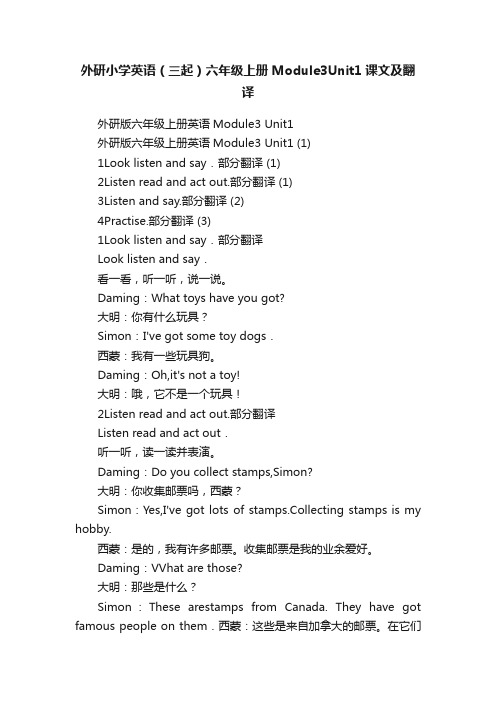
外研小学英语(三起)六年级上册Module3Unit1课文及翻译外研版六年级上册英语Module3 Unit1外研版六年级上册英语Module3 Unit1 (1)1Look listen and say.部分翻译 (1)2Listen read and act out.部分翻译 (1)3Listen and say.部分翻译 (2)4Practise.部分翻译 (3)1Look listen and say.部分翻译Look listen and say.看一看,听一听,说一说。
Daming:What toys have you got?大明:你有什么玩具?Simon:I've got some toy dogs.西蒙:我有一些玩具狗。
Daming:Oh,it's not a toy!大明:哦,它不是一个玩具!2Listen read and act out.部分翻译Listen read and act out.听一听,读一读并表演。
Daming:Do you collect stamps,Simon?大明:你收集邮票吗,西蒙?Simon:Yes,I've got lots of stamps.Collecting stamps is my hobby.西蒙:是的,我有许多邮票。
收集邮票是我的业余爱好。
Daming:VVhat are those?大明:那些是什么?Simon:These arestamps from Canada. They have got famous people on them.西蒙:这些是来自加拿大的邮票。
在它们上面有名人。
Daming:Ha've you got any stamps fromChina?大明:你有来自中国的邮票吗?Simon:Yes,I have. This stamp is from China. And all of these stamps are from China too.西蒙:是的.我有。
上课课件--Module-3-Heroes--Unit-1-She-trained-hard--so-she-became-a-great-player-later.

be brave
always help other people
in need
HERO
with super power
be an expert in an area
save someone’
s life
1. Look at the pictures and answer the questions.
2. Where are they? In a classroom.
3. What are they talking about?
They are talking about the student’s hero.
P18
Task 2
3 Read the passage and complete the table.
Module 3 Unit 1 知识点 3
12. whatever 无论什么 疑问词+ever 无论…… 13. give up 放弃…… give up + 名/动名词
Objectives:
1. To be able to understand a conversation about heroes and identify specific information
2. To learn some key words and expressions
3. To describe your hero and give reasons
will
意志、决心
victory 成功、胜利
simply 实在的,的确
Module 3
Heroes
Unit 1
She trained hard, so she became a great player later.
Module 3 On the radio Unit 1导学案

Module 3 On the radioUnit 1 Remember to look out for the red light !课型:听说课【学习目标】1.知识目标:a.能够掌握宾语从句(2);b.掌握动词后接(to)+v.或v.-ing的形式;c.了解连读规则。
2. 能力目标:能听懂简单的英文广播节目,抓住细节并进行判断;能谈论自己收听广播节目的情况。
3.情感目标:通过学习粗略了解播音节目的制作过程和播音员的生活,培养和强化自己的学习兴趣,锻炼克服困难的意志。
通过不断努力,实现理想。
【教学重难点】:掌握动词的(to)+v.或v.-ing形式作宾语。
【教学过程】课前朗读:lookout(for),win,newsreader,report,reporter,score,everybody,mention,prepare,goal,h ate根据音标读出单词并了解汉语意思,养成学生自主学习词汇的习惯,促使学生迅速进入学习状态。
[检查词汇预习]:a.采取学生结对、小组互查等形式来检查学生对词汇的预习情况。
b.朗读单词,注意发音。
一、情境导入教师可问学生:Do you want to be a newsreader on Radio Bejing? And how can you become a newsreader? 这样会调动学生用英语思维的积极性, 通过小组间互相了解导入新课。
二、小听力(自主完成,合作释疑)1.听Activity 1,Match the radio programmes with the words in the box。
三、大听力多层听(合上书)1. 听activity 3,choose the best answer.( )1). How can we become a newsreader on Radio Beijing?A. RainyB. WindyC. Sunny2. Listen again, check the true sentences.1). In the news room, we collect the latest news and write the reports. ( )2). Daming likes listening to the basketball results. ( )3). Tony is sad that England lost. He hates losing. ( )4). It’ll start raining in the afternoon. ( )5). That’s the end of the eight o’clock news. ( )3.读后做Read the conversation and finishe Activity 5, complete the passage.四、理解意思1.小组内合作解决activity 3的意思,找出不懂的地方。
- 1、下载文档前请自行甄别文档内容的完整性,平台不提供额外的编辑、内容补充、找答案等附加服务。
- 2、"仅部分预览"的文档,不可在线预览部分如存在完整性等问题,可反馈申请退款(可完整预览的文档不适用该条件!)。
- 3、如文档侵犯您的权益,请联系客服反馈,我们会尽快为您处理(人工客服工作时间:9:00-18:30)。
2013年8月18日星期日7 时25分37秒
山东省“十一五“规划课题---初中当堂达标教学操作体系建构与应 用
Interview
Complete the table by interview some of your friends. What’s your favourite radio program? name Favorite radio program
Listen to the tape and answer the questions .
1. What's the latest news? The Russian president arrived in Beijing for a visit to China. 2. What's the score of the China-England match? Now the score is China 1, England 2.
Useful sentences
1 Come this way. 往这边走.
2 Keep studying.
3 Me, too.
不断学习.
我也是
4 Quiet, please.
5 Don’t mention it.
请安静.
不客气
山东省“十一五“规划课题---初中当堂达标教学操作体系建构与应 用
知识点
时25分38秒
例句: ―“Remember to close the door when you leave ” said the teacher. ―I remembered closing the door when I left yesterday afternoon, I don’t know why it is open now. 同样用法的还有: forget to do sth 忘记去做某事 forget doing sth 忘记做过某事 5. 留意某事 : look out for 也有“提防,当心某事”之 意. 例句:You should look out for the pickpocket. 6. 停止做某事 stop doing sth 比较: stop doing sth 停止手上正在做的事情 stop to 2013年8月18日星期日7 do sth 停止手上正在做的事情去做另外 时25分38秒 一件事情
山东省“十一五“规划课题---初中当堂达标教学操作体系建构与应 用
Language points
1 look out (for) 留心,注意 Look out for the thief. 2 take sb around 领某人参观(某地) I’d like to take you around our city. 3 enjoy+doing (动名词) I enjoy talking to him about my family. 4 stop to do停止某事去做另一件事 He stops to talk to his friends. 5 keep doing sth 不断做某事
2013年8月18日星期日7 时25分38秒
山东省“十一五“规划课题---初中当堂达标教学操作体系建构与应 用
Work in pairs. Ask and answer questions about the radio.
1. What do you like listening to? 2. What do you hate listening to? 3. What programme did you listen to the last time you turned on the radio? 4. What do you need to do if you want to be a newsreader? 5. What must you keep doing to work on radio? 6. Do you or your parents decide what to listen to and when to listen to the radio?
山东省“十一五“规划课题---初中当堂达标教学操作体系建构与应 用
山东省“十一五“规划课题---初中当堂达标教学操作体系建构与应 用
The students stopped talking when the teacher came into the classroom. The students stopped to read the books when the teacher came into the classroom. 7. 讨厌,憎恨做某事 hate doing sth = hate to do sth 例句: I hate playing basketball = I hate to play basketball.
山东省“十一五“规划课题---初中当堂达标教学操作体系建构与应 用
课题:Module 3 On the radio
Unit 1 Remember to look out for the red light
齐河县第四中学 任课教师姓名: 年 月 日
山东省“十一五“规划课题---初中当堂达标教学操作体系建构与应 用
3. What's the weather going to be?
It's going to be sunny in the afternoon and rainy in the evening.
4. What are the jobs of Zhang Li and Wang Lin? Zhang Li is a newsreader; Wang Lin is a sports reporter.
The newsreaders of Radio Beijing
2013年8月18日星期日7 时25分38秒
How’s the weather ?
sunny
cloudy
windy
rainy
Good morning! Here’s the weather report for some big cities .Beijing will be ……
Listen to the tape and answer the questions
1 How does Chen Huan feel about taking them around? He feels very happy. 2 Why don’t Daming and Tolt? Because Tony hates losing the football match. 3 How do you think the friends feel about visiting Radio Beijing? Very excited and happy
2013年8月18日星期日7 时25分38秒
The old man keeps thinking about his poor cat.
Exercise
The evening news programme usually has newsreaders two (1)_______, a man and a woman. They latest read the (2)_______ news, and then special reporters (3)_____ give more information about the news. The sports reports come next. When wins the national team (4)______, the newsreaders look very happy, and if they lose , it looks like very bad news. Finally, the weather report tells it’s going to rain (5)_______ or be (6)________ tomorrow.
2013年8月18日星期日7 时25分38秒
Homework
1. Read and recite 2. Do Activity 6 3. Ready for the questions in Activity 7
山东省“十一五“规划课题---初中当堂达标教学操作体系建构与应 用
i
2013年8月18日星期日7 时25分37秒
1. 想做某事 would like to do sth = feel like doing sth 2. 感谢某人做某事 thank you for doing sth = thanks for doing sth. 感谢某人某事 thank you for sth = thanks for sth ―Thank you for helping me = Thanks for helping me. ―Thank you for your help = Thanks for your help 3. 带领某人参观某地: take/ show sb around sp Can you show/ take me around your new school? 4. 记得要做某事 remember to do sth (还没做) 注意:remember 后还可以带动名词做宾语: remember doing sth. 意思是“记得做过某事 (已经做了)” 2013年8月18日星期日7
